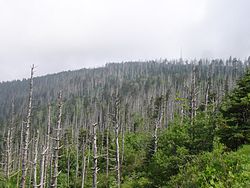.jpg) |
| Lake Fontana in Great Smokey Mountains National Park |
 |
| Southern Appalachian timber harvest in the 1900s |
Agenda 21 is "a comprehensive plan of action to be taken globally, nationally and locally by organizations of the United Nations System, Governments, and Major Groups in every area in which human impacts on the environment." It, together with the Rio Declaration on Environment and Development, and the Statement of principles for the Sustainable Management of Forests, was adopted by more than 178 Governments at the United Nations Conference on Environment and Development (UNCED) held in Rio de Janerio, Brazil, 3 to 14 June 1992. UNCED, also known as the Earth Summit, was held during the period in which George H. W. Bush was president of the United States.
 |
| "Ghost" Fraser Firs killed by the Balsam woolly adelgid on Clingmans Dome, Great Smoky Mountain National Park |
I find it hard to imagine people really concerned with the concept of "sustainable development". "Development" is intended to mean both social and economic development, and in the context in which the word is used internationally, to imply a broad process of social and economic development, including the reduction of poverty, the improvement of health and wellbeing, and the increase of participation in political processes.
 |
| Haiti-Dominican Republic border from the air, showing Haitian deforestation |
There is also an increasing understanding that there may well be problems of resource depletion arising at a global level that may in a few generations create development problems on a global scale. The Earth Summit resulted in a consensus of the nations of the world that there is a responsibility now to take reasonable measures to assure that the rapid development that we have enjoyed for so many decades can be sustained into the indefinite future. The intent of Agenda 21 was to begin that process of assuring sustainable development.
There have been follow up meetings to the Earth Summit and another major meeting is scheduled for this year, Rio +20, marking the 20th anniversary of the initial UN conference. Of course, the United States Government will send a delegation to this important event, and of course the United States Government is planning its positions for the conference now, including developing a set of initiatives to announce in Rio (where Rio +20 will be held).
It would seem that the Obama administration's decision to create a White House Rural Council has been linked in the minds of some with Agenda 21. The mandate for that Council seems to make clear that the purpose of the Council is to improve coordination among federal government agencies in order to improve the cost-effectiveness of government programs in rural areas and "to promote economic prosperity and quality of life in rural America".
No comments:
Post a Comment